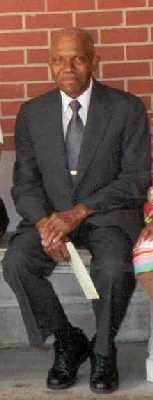 My parents Walter S. And Ida Jones Alexander moved to Tulsa from Guthrie, Oklahoma. They lived at 1621 North Norfolk and I was born there. During the Tulsa Race Riot of 1921, all houses around our house burned to the ground, but our house was not touched. Instead of locking the doors to his house before he and his family fled the on-coming white mob, Dad left his house unlocked. He said the Lord told him to leave the house unlocked. Dad had no guns in the house, so when the mobsters, and the militia, went into the house, they just left it like it was. Dad and his family fled the mobs by going up to Pine Street. But we were interrupted by the National Guards who picked up the men and took them to the Ball Park on 11th Street where Home Depot is located today. The women and children were taken to Brady Theater or to churches. After a day or two, the men were released to their white employers and the men found their wives and children in whatever shelter they were, and those that were lucky and had homes to return to, like my father, returned home. Dad was so kindhearted that he was always referred to as "the kind-hearted Brother Alexander." Well my kind-hearted father let people who has lost their homes come to our house and he let them bring the things they had taken with them as they fled. He let as many as could fit in come to our house.
My parents Walter S. And Ida Jones Alexander moved to Tulsa from Guthrie, Oklahoma. They lived at 1621 North Norfolk and I was born there. During the Tulsa Race Riot of 1921, all houses around our house burned to the ground, but our house was not touched. Instead of locking the doors to his house before he and his family fled the on-coming white mob, Dad left his house unlocked. He said the Lord told him to leave the house unlocked. Dad had no guns in the house, so when the mobsters, and the militia, went into the house, they just left it like it was. Dad and his family fled the mobs by going up to Pine Street. But we were interrupted by the National Guards who picked up the men and took them to the Ball Park on 11th Street where Home Depot is located today. The women and children were taken to Brady Theater or to churches. After a day or two, the men were released to their white employers and the men found their wives and children in whatever shelter they were, and those that were lucky and had homes to return to, like my father, returned home. Dad was so kindhearted that he was always referred to as "the kind-hearted Brother Alexander." Well my kind-hearted father let people who has lost their homes come to our house and he let them bring the things they had taken with them as they fled. He let as many as could fit in come to our house.![]() Meet The Survivors -- Home -- Juanita Delores Burnett Arnold
Meet The Survivors -- Home -- Juanita Delores Burnett Arnold![]()